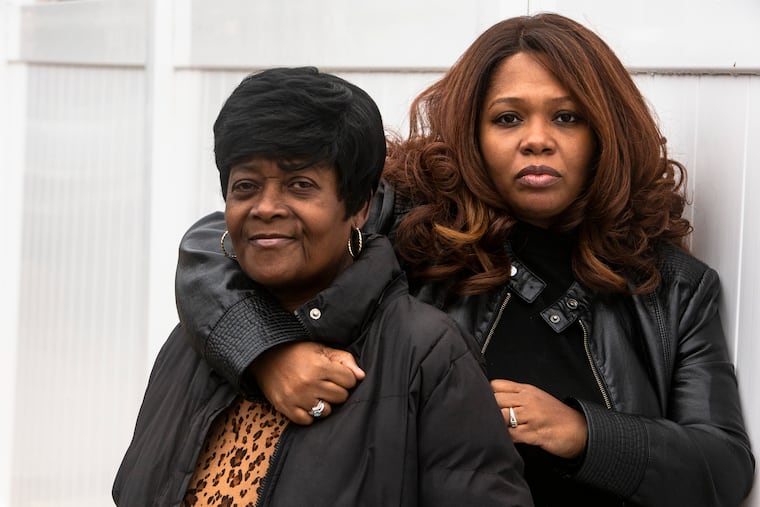This Philadelphia filmmaker produced a love letter to her brother, shot and killed in June | Helen Ubiñas
Shameka Sawyer wanted to show a side of her slain brother that didn’t make the news, which, other than a couple of lines about a shooting in East Germantown, wasn’t much.

At times, watching Shameka Sawyer’s film about her brother’s murder feels a little like stumbling into an intimate conversation between siblings.
“Hey, baby bro, it’s been almost two months since you’ve been gone. … It’s not easy, but we’re getting through it.”
When Sawyer’s 34-year-old brother was gunned down last spring, the grieving filmmaker turned to a familiar tool to cope.
She set up her camera in her basement, sat on her couch, and started recording. The result: part eulogy, part love letter full of remembrances, and some regrets.
“This is the conversation I wished I had with him before he was gone,” said Sawyer, 43, when I called to talk about her 20-minute documentary. “It was a form of therapy, a way to feel close to him.”
She also wanted to show a side of him that didn’t make the news, which other than a couple of lines about a shooting in East Germantown wasn’t much.
Allen Taylor was a father and about to be a grandfather; his granddaughter was born two months after he was killed. He was also a musician and a caretaker for his 67-year-old mother, Brenda Sawyer, who’d recently undergone a kidney transplant.
He was shot and killed on June 1, one of the city’s nearly 500 homicides in 2020, after he left the Germantown home he shared with his mother to go to a nearby store. Not long after, a friend was pounding on their front door telling Sawyer that she needed to get to the hospital; Taylor had been shot in the head. He was pronounced dead on arrival at Einstein Medical Center, six days shy of his 35th birthday. No arrests have been made for his murder.
» READ MORE: A support group for gunshot survivors is now the focus of a documentary — and it’s beautiful | Helen Ubiñas
Taylor was Shameeka Sawyer’s only remaining sibling; their older brother, Wendell Sawyer Jr., died of brain cancer in 2011.
Those specifics are in the film, but mostly it’s Sawyer and her mother speaking directly into the camera about their loss, compounded by the cruelly abbreviated grieving rituals that loved ones have been subjected to because of COVID-19: a smaller funeral, time spent apart, words left unsaid.
“I just don’t understand why,” his mother says in the film. “Why did my son have to leave this earth like that?”
When Sawyer told her mother that she wanted to make the film, she didn’t hesitate. It was painful, to sit in his room, surrounded by his things, and talk about a son she still expects to walk through the door. But her daughter “had things she wanted to tell him.” And the mother wanted other families to see that they weren’t alone in their grief of losing a child.
The siblings were always supportive of each other’s endeavors, she recalled. It was Sawyer who planned Taylor’s first hip-hop show. She threw herself into his “Bout Mine” T-shirt line.
“You always had that ‘it’ factor,” she tells him in the film, often flipping between past and present tense. “It’s like magic. … You were like magic to me.”
She laughed when she recalled how he’d drag her around the city, camera pointed at him. It was a way for him to help her see the city through his eyes, but also the talent he always saw in her.
» READ MORE: ‘Weight of Death’ docuseries illustrates the depth and breadth of Philly’s gun violence | Helen Ubiñas
He celebrated her 2014 creation of the 5 Shorts Project, a nonprofit that teaches aspiring filmmakers of color how to create movies, but she wasn’t sure he truly understood how much his support meant.
“You made me feel like I can do anything, and I want to thank you for that. I never really got the chance to tell you this while you were here, but I hope that you hear me now.”
The siblings were always close. But recently she’d noticed that he’d seemed to be growing distant.
He’d lost weight, he wasn’t taking care of himself. While she didn’t go into detail about it in the film, she did hint of struggles. Later she told me he suffered with mental health issues.
“It seemed like you were in this space where I really couldn’t reach you,” she tells him in the film, “and I really didn’t know what was going on in your life.”
In one especially poignant moment in the film, she brings up his last Instagram post, a photo of himself shot from the side, looking ahead with the words “I listen more than I talk.”
“Now I’m like, ‘Wow, there must have been a message in that, and I totally blew that.’”
The film, she titled Sometimes I Cry in June, has been accepted into several film festivals. Eventually, Sawyer wants to create a series spotlighting families who have lost loved ones to gun violence.
But for now, it stands on its own as a way to a brother who is loved and missed.
“So this is not goodbye,” Sawyer says before turning off the camera. “This is I’ll see you later.
“I love you.”